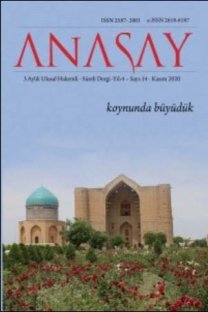LÜBNAN’DAKİ SEÇİM SİSTEMİ VE PARTİLERİ
Bu çalışma, Fransız Mandası tarafından 1926 yılında Lübnan Anayasası olarak dayatılan, temelde batılı ve esasen Fransa tarafından sınırları çizilmiş, 1943 ve 1947 yıllarındaki anayasa değişiklikleriyle de temel esasları belirlenmiş Lübnan seçim sistemini ve partilerini temel almaktadır. 1926 ile 1975 yılları arasını merkeze alan bu çalışmada, Lübnan demokrasisi olarak da bilinen Konfesyonel sistemin Lübnan Anayasası ve hükümetteki temsiliyeti ile ilişkiside ortaya konularak bu sistemde dini grupların gücünün yönetime sirayeti tartışılmıştır. Ayrıca Lübnan seçimlerinin ideoloji ve partilerin mi yoksa geleneksel ailelerin rekabet alanı mı olduğu tespit edilmeye çalışılmıştır. Son olarak, 1975 iç savaş yıllarına kadar olan dönemde Lübnan nüfusunun teorik yüzdesine eşit temsil edilen Partiler ve ittifaklar da bir bütün olarak incelenmiştir
Anahtar Kelimeler:
Lübnan Secim Sistemi, Lübnan Partileri, Lübnan Anayasası, Fransız Mandası, Mezhep Partileri, Fransız Mandası, Baas İdeolojisi, Cemal Abdünnasır
ON THE WORD BAN IN THE DÄDÄ QORQUT NARRATIVES
One of the most researched texts on Turkish philology and folklore studies is the text of Dädä Qorqut. The most important reason of it is that there are many problems waiting for a solution in the text. The creation of the Dädä Qorqut narratives is important question and this problem is not yet certainly solved. Some assumptions have been put forward about this problem. From a philological point of view, the meaning of some words in the text is still uncertain. To solve the problematic words need to explain their origins and give meaning according to the context. In the article, a new meaning suggestion about ban is proposed considering the contexts of narratives and the origin of ban.
Keywords:
Dädä Qorqut narratives, etymology, ban,
___
- KAYNAKÇA
- A. Arşivler
- USA FOIA General Central Intelligence Agency Records
- Lebanon Handbook(1971). CIA-RDP79-00891A001000030001-9.
- UK Foreign and Commonwealth Office (FCO)
- FCO (1979). 93-1999.
- Bassel F. Salloukh, Rabie Barakat-vd (2015). Politics of Sectarianism in Postwar Lebanon, London: Pluto Press.
- El Khazen, Farid (2003). “Political Parties in Postwar Lebanon: Parties in Search of Partisans”, Middle East Journal, 57: 4, 605-624.
- Gaspard, T.K. (2003). Political economy of Lebanon, 1948-2002: The limits of laissez-faire, Boston: Brill.
- Harris, William (2014). Lebanon: A History, 600- 2011, Oso: Oxford University Press.
- Hess. Jr., Clyde G.ve Herbert L. Bodman, Jr. (1954). “Confessionalism and Feudality in Lebanese Politics”, Middle East Journal, 8:1, 10-26.
- Hourani, H., Naaman, I.-vd. (1998). “Perspectives on Elections from the Arab World”, Middle East Report, (209), 30-40.
- Hudson, Michael C. (1966). “The Electoral Process and Political Development in Lebanon”, Middle East Journal, 20:2, 173-186.
- Kingston, Paul W.T. (2013). Reproducing Sectarianism: Advocacy Networks and the Politics of Civil Society in Postwar Lebanon, Albany: State University of New York Press.
- Maktabi, Rania(1999). “The Lebanese Census of 1932 Revisited. Who Are the Lebanese?”, British Journal of Middle Eastern Studies, 26:2, 219-241.
- Michael W. Suleiman (1967). “The Role of Political Parties in a Confessional Democracy: The Lebanese Case”, The Western Political Quarterly, 20:3, 682-693.
- Najem, Tom (2012). Lebanon: The Politics of a Penetrated Society, New York: Routledge.
- Nir, Omri (2004). “The Shi'ites during the 1958 Lebanese Crisis”, Middle Eastern Studies, 40:6, 109-129.
- Salibi, Kamal (1966). “Lebanon under Fuad Chehab 1958-1964”, Middle Eastern Studies, 2:3, 211-226.
- Stocker, James R. (2016). Spheres of Intervention: US Foreign Policy and the Collapse of Lebanon, 1967–1976, Ithaca: Cornell University Press.
- Traboulsi, Fawwaz(2007). History of Modern Lebanon, London: Pluto Press.
- Zamir, Meir (1980). “The Lebanese Presidential Elections of 1970 and Their Impact on the Civil War of 1975- 1976”, Middle Eastern Studies, 16: 1, 49-70.
- Ziadeh, Nicola A. (1960). “The Lebanese Elections, 1960”, Middle East Journal, 14:4, 367-381.
- Zuwiyya, Jalal. (1972). The Parliamentary Election of Lebanon 1968, Leiden: Brill.
- ISSN: 2587-2001
- Yayın Aralığı: Yılda 4 Sayı
- Başlangıç: 2017
- Yayıncı: İshak KÜÇÜKYILDIZ
